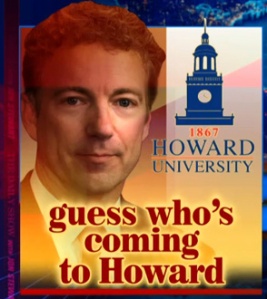 I have the utmost respect for Mr. Clarence Page of the Tribune's editorial board for his lifelong mission to express truth through his words. Mr. Page wrote an article on his blogs this week that impressed me greatly. He made me aware of a new word coined as a result of Sen. Rand Paul's news-making speech at historically black Howard University.
I have the utmost respect for Mr. Clarence Page of the Tribune's editorial board for his lifelong mission to express truth through his words. Mr. Page wrote an article on his blogs this week that impressed me greatly. He made me aware of a new word coined as a result of Sen. Rand Paul's news-making speech at historically black Howard University.
I hope Mr. Page will appreciate my sharing his words for your empowerment. Thank you Sir:
Within hours after, Sen. Rand Paul's news-making speech at historically black Howard University someone posted this new definition on the user-driven Urban Dictionary website of an awkward-sounding but quite timely verb: "whitesplain":
"The act of a caucasian (sic) person explaining to audiences of color the true nature of racism," says the entry; "a caucasian (sic again) person explaining sociopolitical events and/or history to audiences of color as though they are ignorant children ...."
Whitesplaining appears significantly to be derived from "mansplaining," which first appeared in a thoughtful, hilarious 2008 Los Angeles Times essay by Rebecca Solnit titled "Men Who Explain Things."
Urban Dictionary now defines mansplaining as "condescending, inaccurate explanations delivered with rock-solid confidence of rightness and that slimy certainty that of course he is right, because he is the man in this conversation." I am guessing that a woman wrote that definition. Message received.
Anyway, as an example of how whitesplaining should be used, consider Urban Dictionary: "U.S. Sen. Rand Paul whitesplained to students at Howard University," it says, "that a black Republican founded the NAACP."
Indeed, even Paul looked surprised at Howard when, after he asked if anyone knew that the National Association for the Advancement of Colored People had been founded by Republicans, his audience responded with a resoundingly impatient "Yes!"
"We know our history," one student shouted. Unfortunately, Paul didn't. He had to be prompted from the audience with the name of Massachusetts Republican Edward Brooke, the first African-American to be elected to the U.S. Senate by popular vote — and Paul still mangled it twice as "Edwin Brooks."
Worse, he expounded at length on the historically incorrect narrative that conservatives often give, that blacks left the party of Abraham Lincoln to follow Franklin D. Roosevelt's promise of "unlimited federal assistance," while Republicans only have the "less tangible ... promise of equalizing opportunity through free markets."
Yet, even if you buy that oversimplified view of history, as conservatives with selective memory often do, Paul completely omitted a much more important sea change, the seismic racial realignment that followed President Lyndon B. Johnson's 1964 Civil Rights Act.
In fact, Republican nominees continued to receive sizable black support; 39 percent to Dwight Eisenhower in his 1956 re-election, according to the Joint Center for Political and Economic Studies, and 32 percent to his vice president, Richard Nixon, in 1960.
But after conservatives nominated Sen. Barry Goldwater, who voted against the civil rights bill, to oppose Johnson in 1964, LBJ won 94 percent of the black vote. No Republican presidential candidate has received more than 15 percent of the black vote since.
Widening the divide was the "Southern strategy" with which Republicans mined racial backlash to win white votes, first in the South, then nationwide. Some Republicans, like former party chairmen Ken Mehlman and Michael Steele, have been quite candid and contrite in denouncing such tactics, only to be shouted down by whitesplainers in the Grand Old Party's right wing.
In fact, "rightsplainers" more aptly describes Paul's selective view of GOP history, including his own. When he was questioned about his 2010 interviews with the Louisville Courier-Journal and on Rachel Maddow's MSNBC show in which he criticized part of the 1964 Civil Rights Act, Paul denied the charge. "I've never wavered in my support for civil rights or the Civil Rights Act," he said at Howard.
Yet, as videos posted on various websites show, he wavered a lot. He opposed the part of the act that banned discrimination in restaurants, hotels and other privately owned public accommodations.
True to his libertarian beliefs, Paul used the old argument that the magic of the marketplace would prevent merchants from turning away business. But, as an African-American who is old enough to remember having to sleep in the family car on long trips — in the South and the North — after being turned away repeatedly from hotels and restaurants, I have a sharply different view.
But mere ignorance does not deter the rightsplainers. They just keep on talking.
I could not have said it better! And that’s my Thought Provoking Perspective…

FaceBook @ John T. Wills
Twitter @ John T. Wills













No comments:
Post a Comment